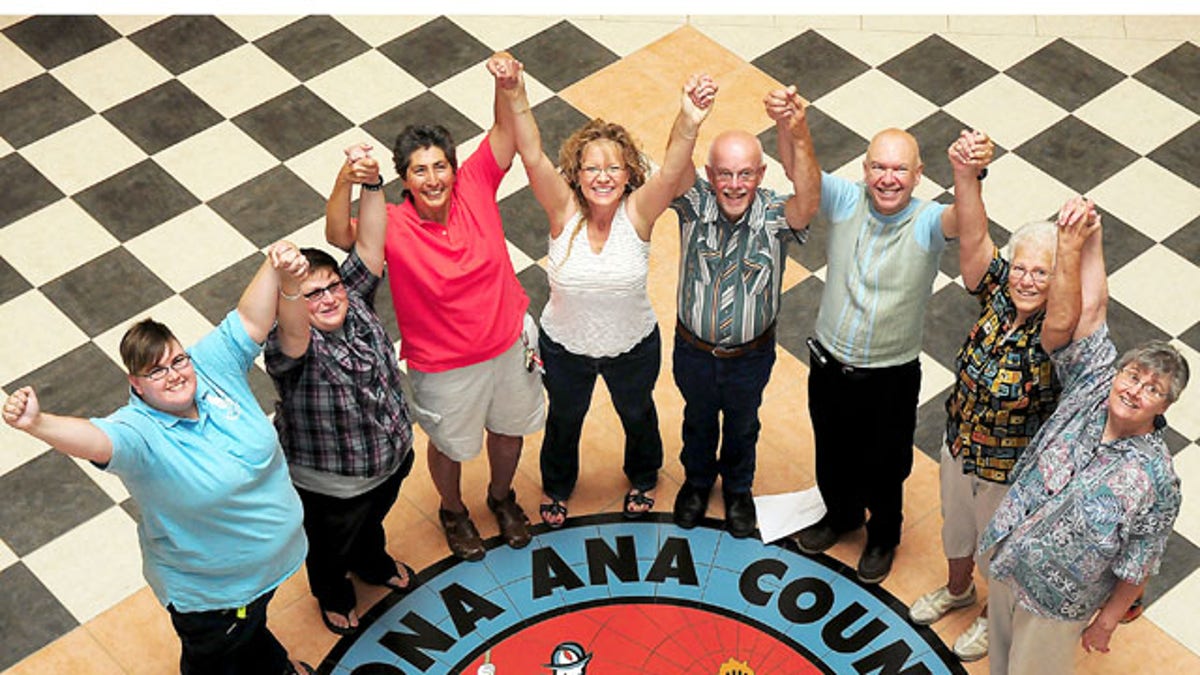
August 22, 2013: Happy newlyweds join hands at the Doña Ana County Government Center after receiving their marriage licenses and wedding in Las Cruces, N.M. The married couples include, from left: Erin Haynes and spouse Cynthia Haynes of Los Lunas, N.M.; Rev. Vangie Chavez and spouse Traci Garcia of Albuquerque, N.M.; Richard Sunman and spouse Thom Hinks of Albuquerque, N.M.; and Judi Schultz and spouse June Damuth of Las Cruces, N.M. (AP Photo/Las Cruces Sun-News, Shari Vialpando-Hill)
The clerk for New Mexico's most populous county planned to begin issuing marriage licenses to gay and lesbian couples Tuesday after a state district judge declared same-sex marriage legal.
State District Judge Alan Malott on Monday ruled New Mexico's constitution prohibits discrimination on the basis of sexual orientation, ordering Bernalillo County to join the state's other two population centers in recognizing the unions.
The decision comes on the heels of an order last week from a judge in Santa Fe that directed the county clerk there to begin issuing marriage licenses to same-sex couples. That followed a decision by the clerk in the southern New Mexico county of Dona Ana to recognize same-sex couples.
But Malott's ruling was seen as more sweeping than the temporary Santa Fe order because he directly declared that gay marriage was legal.
Laura Schauer Ives, a lawyer for the American Civil Liberties Union of New Mexico, called it "monumental" and said the group didn't expect such a broad decision by Malott. The judge had been asked only to order that the state recognize, on her death certificate, a dying woman's marriage Friday in Santa Fe to her longtime partner.
But after a short hearing in which neither the counties nor the state objected to the request, Malott also ruled on the broader lawsuit by that couple and five others seeking marriage licenses.
"We were stunned and amazed," Ives said.
However, it's uncertain whether clerks in the state's 30 other counties, who were not defendants in the lawsuit, will use the judge's ruling as a signal that they can issue marriage licenses to same-sex couples. Assistant Attorney General Scott Fuqua said the decision wasn't binding on clerks outside Bernalillo and Santa Fe counties.
Malott's order came during a hearing seeking an order for the state to recognize the marriage of Jen Roper, who has cancer, to Angelique Neuman.
The couple wed at a Santa Fe hospital after a state district judge in a separate case ordered the Santa Fe County clerk to issue same-sex licenses. Dona Ana's clerk decided on his own last week to recognize gay and lesbian marriages.
"It's been a long, long fight," Neuman said. "I'm glad things went our way."
The couple last week joined the lawsuit brought by the ACLU on behalf of five other lesbian couples.
One of those couples, Tanya Struble and Therese Councilor of Jemez Springs, said they plan to get their marriage license first thing Tuesday. But they were unsure whether they would be married immediately or wait for a ceremony that can be attended by family and friends.
"We've never done this," Struble said in an interview after the court hearing.
Struble said she was pleasantly surprised by the broader ruling in the case.
"I thought maybe it would be partially good, but it was 99.9 percent awesome," she said.
Christine Butler of Albuquerque, who opposes gay marriage and attended the hearing, said the judge's ruling violates her rights.
"I don't want to bring my children or go to places and see same-sex couples showing a lot of affection. ... That's against God's law," Butler said.
Bernalillo County Clerk Maggie Toulouse Oliver said she had 1,000 licenses printed in case Malott ordered her to issue licenses for same-sex marriages. Her office spent the day preparing for what is expected to be a flood of applicants Tuesday.
On Monday morning, couples were lined up in Santa Fe waiting for the clerk's office to open. More than 100 licenses had been issued by the end of the day, bringing to 157 the number of same-sex marriage licenses issued since Friday.
Dona Ana County Clerk Lynn Ellins began issuing marriage licenses to same-sex couples last Wednesday. He said 137 couples from around the state and from neighboring Texas got licenses last week, and more were in the works Monday.
A group of Republican legislators is planning to file a lawsuit to stop clerks from issuing licenses to same-sex couples.
One of those lawmakers, Sen. William Sharer of Farmington, said it is up to the state's Legislature, with the consent of the governor, to make laws -- not its county clerks or district judges.
"It is inexplicable how a district court just today discovered a new definition of marriage in our laws, when our marriage law has not been changed in over a century," Sharer said.












































